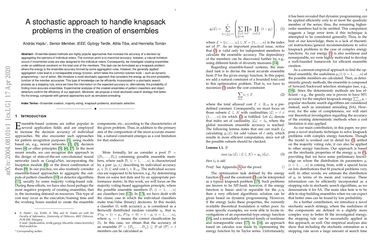A stochastic approach to handle knapsack problems in the creation of ensembles
Ensemble-based methods are highly popular approaches that increase the accuracy of a decision by aggregating the opinions of individual voters. The common point is to maximize accuracy; however, a natural limitation occurs if incremental costs are also assigned to the individual voters. Consequently, we investigate creating ensembles under an additional constraint on the total cost of the members. This task can be formulated as a knapsack problem, where the energy is the ensemble accuracy formed by some aggregation rules. However, the generally applied aggregation rules lead to a nonseparable energy function, which takes the common solution tools -- such as dynamic programming -- out of action. We introduce a novel stochastic approach that considers the energy as the joint probability function of the member accuracies. This type of knowledge can be efficiently incorporated in a stochastic search process as a stopping rule, since we have the information on the expected accuracy or, alternatively, the probability of finding more accurate ensembles. Experimental analyses of the created ensembles of pattern classifiers and object detectors confirm the efficiency of our approach. Moreover, we propose a novel stochastic search strategy that better fits the energy, compared with general approaches such as simulated annealing.
PDF Abstract